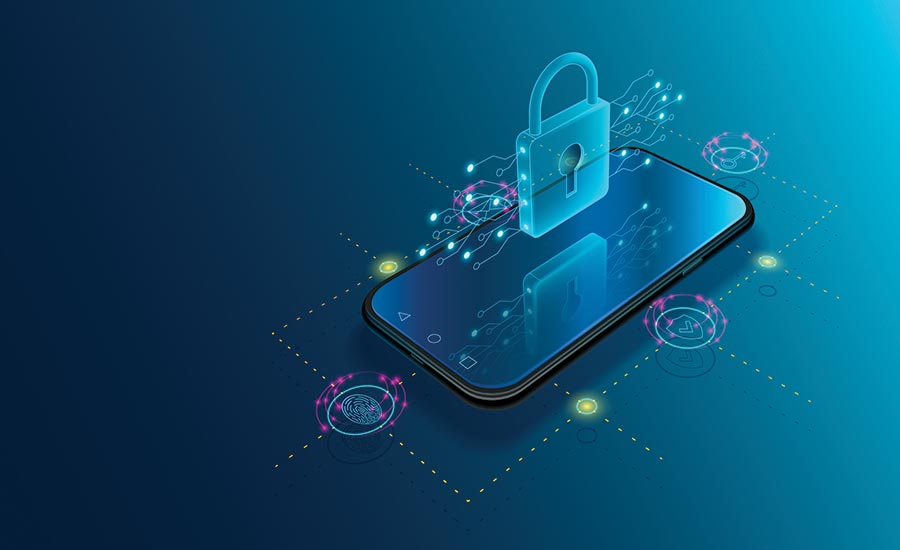Cyberattacks resulted in the theft or impact of two billion data records in the first half of 2017, while ransomware payments topped US$2 billion, more than doubling from the same period in 2016.
Furthermore, due to the COVID-19 global pandemic and the rise in remote employment, cybersecurity statistics show a dramatic increase in data breaches and hacks in 2020.
How to secure your smartphone from cyber threats
As a result, in 2022, it was anticipated that the global market for information security would grow to $170.4 billion. Since the late 1980s, cybercrimes have evolved multiple times, using advances in information technology as their primary means of delivery.
This means that the scope and sturdiness of cyberattacks have grown significantly in recent years. For example, the Internet Engineering Task Force attack in RFC 2828 in May 2000 defined an attack as an “Assault on system security resulting from an intelligent threat or a brilliant act that is a deliberate attempt (a method or technique). It aims to evade security services and violate the security policy of a system”.
Any offensive action targeting computer networks, infrastructures, personal computers, smartphones, or other mobile devices is called a cyberattack.
An attacker is an individual or process that makes unauthorized, potentially malicious attempts to access data, functions, or other restricted system parts. An “active attack” aims to change system resources or impact how they function.
Also Read- How to optimize your smartphone’s battery life
A “passive attack” tries to gather or use information from the system without depleting its resources. (e.g., wiretapping). However, to stop this from happening to your cell phones, you should use these hacks and tips:
Possess a Password and Safe lock
Locking your mobile device with a password is the first step you should take to enable its security. Today, you may employ fingerprint, facial, and even eye (iris) recognition technology to authenticate passwords instead of random letters and numbers.
Every password on your phone should be strong and of a high standard, and each one should be unique and different from the others and the primary password for the device.
Make careful Use of two-factor authentication wherever possible. You start by entering a password. The software then uses SMS or email to send a code to your phone. To pass the two verification procedures, you must input that code. This increases the entrance process’s complexity, which makes hacking attempts twice as tricky. The FIDO Alliance, which offers a more secure and seamless way to access mobile phone apps safely and websites, is moving away from password-only security.
Another crucial piece of advice is to update your passwords periodically. This will force hackers to be alert and make it more difficult for them to be successful.
Make Use of an Antivirus software
Any internet-connected device, including mobile phones, requires antivirus software. There are many apps and solutions for mobile security on the market. Installing the one that best meets your security requirements only takes a little research.
Your phone is regularly scanned for viruses by antivirus software to ensure its safety. Although they take longer, comprehensive scans are also available.
It would help to run these to ensure your phone is fully secured periodically. In addition, it would help if you always had the most recent antivirus software loaded on your phone because new threats and virus mutations are constantly emerging.
Avoid utilizing public or accessible WiFi networks
Following this advice is the best practice for using computers and mobile devices. Mobile devices, visible and accessible to anybody on the web, are particularly at risk when using public or open WiFi networks.
Therefore, when you are away from a secure network or are away from home, utilize your data plan to access the internet rather than relying on WiFi.
If you’re forced to use an unsecured internet connection, a VPN on your phone is an additional option. Doing this can prevent hackers from accessing your phone on public networks.
Instead of sharing it with everyone on the public network, VPNs give you a secure phone connection to a private server. Additionally, it is safer because your data is encrypted as it moves from server to server.
Never Use Unreliable Websites or Apps
Nearly 9 million apps are accessible, many of which are cost-free. People are frequently enticed to download various entertaining-looking apps, but beware: hackers utilize them to access your mobile device without your permission. So be cautious when choosing which apps to install and what permissions to provide them. Doing this can prevent hackers from accessing your phone on public networks.
Instead of sharing it with everyone on the public network, VPNs give you a secure phone connection to a private server. Additionally, it is safer because your data is encrypted as it moves from server to server.
Avoid being duped by unscrupulous apps like you wouldn’t visit a dubious website or click on a strange-looking link. Instead, only use apps or go to mobile websites that are reliable and trustworthy. Download apps from the leading app shops, including Google Play and the App Store.
Take care while sharing information on mobile websites and apps. As a final reminder, avoid providing important information or personal data to apps, websites, or emails whose legitimacy you doubt.
Switch on data encryption
If encryption is not currently enabled on your device, you must configure it. Then, your information can be protected from hackers by being scrambled in a code unfamiliar to them.
At the same time, it moves between servers, which is when it is most vulnerable.
Configure remote wiping options
You can delete any data from your phone with this feature, even if the actual phone is no longer in your possession. So if your phone is misplaced and you can’t find it, it’s an excellent safety feature.
Each device has a unique approach for configuring remote wipes. However, regardless of your device, you can enable remote wipes by following the instructions in this tutorial from the IT department at Northern Michigan University.
Imagine you have a tool for managing devices like Prey. In that instance, tracking and other features like remote wipes are probably included in their service.
To ensure no one can access your sensitive information, you can remotely format your mobile device using Prey. However, the wipe will also remove all content from the device, including the Prey agent.
Therefore, it would be beneficial if you only utilized it when protecting your data was more critical than restoring the device.
Disable your auto-complete function
Doing this can stop unauthorized access to stored, sensitive personal data. Delete your cookies, cache, and browsing history regularly. Removing your virtual trace is critical to reducing the quantity of data that prying eyes might collect.
Some other tips to keep handy to secure your phone from cyberattacks
Use a security app to improve your level of protection. Owners of Android devices have access to Webroot’s all-inclusive Mobile Security for Android app, which includes antivirus defense and lets you remotely find, lock, and delete your phone if you misplace it.
Do you own an iPhone? Turn on Find My iPhone. You can locate your phone if you misplace it and stop hackers from getting their hands on it by enabling the option in your settings.
To boost mobile security on your iPhone and iPad, Webroot also provides a free safe web browser for users of iOS devices.
In conclusion, you may consider a Career in Data Security. There is no stopping the world from connecting more and more every day. The most recent developments in the digital world are the Internet of Things and 5G smartphones.
This indicates that the knowledge and abilities required to combat cybercriminals constantly evolve. As a result, there is a rising need for qualified cybersecurity professionals to operate the front lines of war.
That need only continues to rise every year. So in addition to learning how to protect your mobile device and personal information, becoming an expert in cybersecurity tactics can help you launch a demanding, exciting, and lucrative job.

